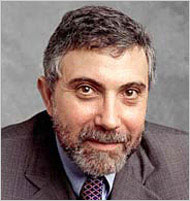Salzburg, Austria— Catching my eye in Monday’s New York Times was a pair of columns from Paul Krugman and Ross Douthat. Krugman, the liberal Nobel Prize economist, and Douthat, the 29 year-old conservative hired to fill the shoes of Bill Kristol, both addressed the health care legislation recently proposed to Congress.
The bill in question, a sprawling 895 page piece of legislation, would provide healthcare for 95% of Americans, according to Democrats. It would also create a public health plan that would allow Americans to purchase health insurance from the government regardless of pre-existing conditions. This public option, which is fiercely opposed by Congressional Republicans, was the focus of a robust NYT/CBS public opinion poll released on Sunday. Its results were ignored by Douthat in his analysis, while they were used as a building block for Krugman’s column. The stylistic differences between the two pieces make it easy to see why Krugman’s work is consistently more polished then that of his colleague.

Ross Douthat
The meat of Douthat’s problem is that he’s not really sure if he wants to write about healthcare at all. He begins by addressing the process of government itself. “There was one small consolation for Republicans amid last November’s shellacking. For at least four years, their opponents would enjoy the dubious pleasure of trying to govern the United States of America,” he says.
A paragraph later he states that in a hypothetical world without political constraints “conservatives would encourage people to self-ration, by putting a certain number of health care dollars directly in their hands and leaving the rest to market forces.” However, this vision collides with the desires of those within the Republican Party.
In the NYT/CBS poll, half of Republicans supported a public plan, in addition to three-fourths of Independents and 9 out of 10 Democrats, making Douthat’s vision of cohesiveness amongst his cohorts fiction. Of course, it’s possible his “conservatives” may just be a reference to the Republican leadership, which then by Douthat’s admission is completely out of touch with what its party wants.
And how do Americans rate the GOP’s plans for healthcare reform? Eighteen percent of those surveyed said the Republicans are more likely to better healthcare, while 57 percent said Democrats would usher in more helpful reform. In fact, even a quarter of Republicans said Democrats had a better vision for healthcare.  And yet, instead of addressing this schism, or putting forth a few basic reasons why a “market-based” system of healthcare would work, Douthat spends his time trolling about in the muck of hypothetical and pelting the reader with his musings about how the Democrats will soon realize that governing is much harder than they thought.

Paul Krugman
In Krugman’s column, he cites the poll off the bat, saying, “If surveys like the New York Times/CBS News poll released last weekend are any indication, voters are ready for major change.” It gives his argument–that centrist Democrats must refrain from railing against a public option and obfuscating reform–a punch that sustains it throughout the piece. Krugman’s read is that it is not Republicans (who on healthcare, seem to be uniformly saying nothing more than no) but Democrats that are the greatest danger to reform.  It  is a provocative and seemingly accurate conclusion. But, it’s not an idea that’s simply reliant upon his observations.
Krugman quotes Democratic Senator Ben Nelson as saying the public plan is a “deal breaker,” because private insurance companies can’t compete and he implicates North Dakota Senator Kent Conrad as well. “[Conrad] offers a  perfectly circular argument: we can’t have the public option, because if we do, health care reform won’t get the votes of senators like him,” Krugman says.
This reasoning has some teeth. It doesn’t conflate a hypothetical with the stubborn  logistics of government in order to simply conclude that legislating is tough stuff.  No, instead  it tells me something important that I need to know about a crucial policy debate, which is what good column writing should accomplish.
Of course, I write this from Austria, where I’ve been asking everyone I meet about how their health care system–a single payer, government run program–measures up. Though most Austrians have only public health insurance, private insurance is available for a price. I asked one couple in Salzburg why someone would buy private insurance. Was it to avoid long bureaucratic lines? Was it to procure better treatment? They shook their heads and said that the main reason to buy private health insurance was to ensure a private room and a bigger menu at the hospital. The fact that this is the defining factor between public and private health insurance in some countries in fodder for 10 columns in itself.
Krugman seems hairier than Douthat. I think that explains it all.
Hello Dan, I read your article on Democate Professors at U. of Oregon. There is one thing I would like to offer. Conservatives represented by contributers in the American Conservative, or Antiwar.com are a far cry from the neoconservative types that hyped our current wars. Many of these neocon’s are now saying they were always Democates (Richard Perle). The American Conservative magazine is a great thought provoking read. I believe most of your professors are angry that the only people talking out against the war now that we have Obama’s wars are Conservatives. They may have many other issues with the Obama other then his lies on the war like his budget defict, bail out of Wall Street, not a peep on NAFTA, Climate change law that is just a Wall Street golden egg rather than help the enviorment, etc., etc. If you want to study, report on what happens when there is no party competition just look at places like Detroit, Philly and another hundred large and small cites where Democates have ruled for decades. Let your professions know of your findings. Keep up the good work. Peace, McD